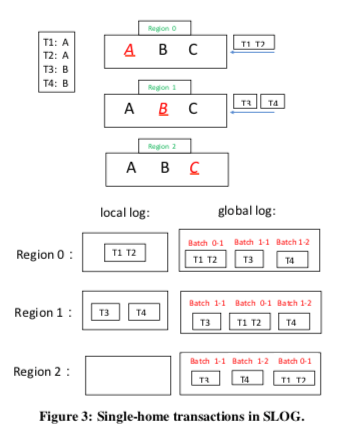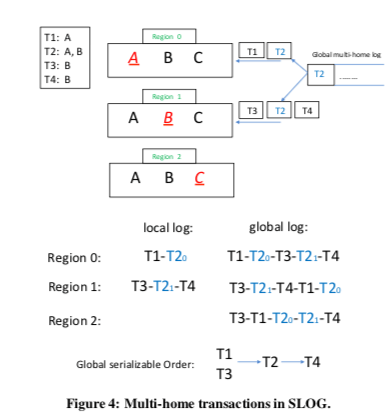SLOG: Serializable, Low-latency, Geo-replicated Transactions
0x00 基本思路
SLOG这篇Paper可以看作是之前Calvin数据库的优化设计。SLOG设计为一个跨区域复制的且满足strict serializability一致性的数据库。目前支持跨区域复制且满足strict serializability的数据库的代表就是Spanner,但是SLOG的设计与其有很大的差别。跨地域复制网络带来的延迟就会很大,所以跨地域复制的数据要支持低延迟的写操作,常见的操作就是,1. 完全使用异步复制的方式,2. 同步复制只会复制到最近的区域。在要低延迟又要强一执性所以难避开异步复制的情况下,SLOG这里的基本思路使用master-oriented的设计,引入了home的概念。SLOG中如果一个事务只访问了master都在一个region内的数据,一般就是一个数据中心之内,那么这个事务就是一个single home的事务,否则就是一个multi home的事务。
总体架构
在SLOG中,系统有多个Region。每个Region里面保存着整个数据库的多个副本,数据会被切分为多个partition,其中一个region里面的partition会是master。这个master也对应到SLOG中“home”的概念。同一个region中不同的partition的“home”之间是没有任何关系的。在一个region内,有一个基于Paxos实现的local input log,这个local input log中记录的操作只会是修改master在这个region里面的partition。SLOG也会使用批量的方式将这些local input log发送到其它的regions保存多个副本,每个batch会包含了一个sequence number,其它regions里面的副本可以通过这个sequence number来了解到是不是缺失了某些batch。这样的机制下面,一个region里面的最终会包含全部的input log,当然可以因为网络等的原因会有一些延迟。每个region内的SLOG通过deterministic transaction processing来重放input log。SLOG通过使用deterministic transaction processing机制来确保来以相同的顺序处理相同的input log,最终会得到完全一样的内部状态。在这种设计下面,single-home transactions就会是一个region内的操作,相对来说比较简单,而multi-home transactions就会比较复杂。另外在SLOG,事务执行会有两种模式:(a) after the region completes the transaction (SLOG-B) or (b) after the region completes the transaction AND it has been replicated to a configurable number of nearby regions (SLOG-HA).
0x01 Single-home transactions
SLOG的数据是以granule粒度进行分配,这个可以就是单条记录,也可以是一个数据range。对于每个granule,会包含这样的两个元数据信息,1. 写操作时候的master region的ID,2. 这个granule的master改动次数的计数值。这两个元数据也会随着granule进行复制操作。这两个元数据可以保存一个single 8 bit integer 值中,具体和remastering机制相关。在一个region中,会有一个distributed index,称之为Lookup Master,用于维护granule ids -> 8-bit value元数据的映射关系。这个index为异步复制的,所以可以这个index里面的数据是过时的,SLOG需要一种机制来处理读取到这里面过时数据的机制。
-
客户端在请求SLOG处理事务的时候,它可以发送到离它最近的region,而不用额外处理granule master的信息。一个region在接受到客户端的请求之后,从Lookup Master获取要访问的granule的hone的信息。如果得到的信息限制访问的数据在一个region中,则假设为single-home transaction,并将这个请求发送到对应的region。否则这个事务就是一个multi hone transaction。这部分的处理如下的伪代码,
function ReceiveNewTxn(txn): masterInfo = ∅ foreach granule in txn.readSet union txn.writeSet masterInfo = masterInfo union LookupMaster.Lookup(granule) txn.masterInfo = masterInfo if (num of unique regions in txn.masterInfo == 1) txn.singleHome = true send txn to InsertIntoLocalLog(txn) of that home region else txn.singleHome = false send txn to the multi-home txn ordering module //ordering module orders all multi-home txns and calls //InsertIntoLocalLog(txn) at every region in this order -
在single-home transaction的情况下,其hone region在收到这个请求之后,先将其暂存到内存中,然后最为一个batch通过Paxos复制到这个region的input log中。这里对应到InsertIntoLocalLog的逻辑,伪代码如下,
function InsertIntoLocalLog(txn): if (txn.singleHome == true) append txn at end of localLogBatch else accessSet = ∅ foreach <granule,granule.homeRegionID> in txn.masterInfo if (granule.homeRegionID == this.regionID) accessSet = accessSet union granule if (accessSet != ∅) t = new LockOnlyTxn(txn.ID,accessSet) append t at end of localLogBatch if (isComplete(localLogBatch)) batchID = insert localLogBatch into Paxos-managed local log call ReceiveBatch(localLogBatch, batchID) at each region init new localLogBatch -
在每个Region的local input log之外,一个额外独立的Paxos进程将local input log复制到一个global log。这里对应到下面ReceiveBatch伪代码的逻辑,
function ReceiveBatch(batch, batchID): localLogs[batch.regionID][batchID] = batch prevID = largest batch ID in global log from batch.regionID while (localLogs[batch.regionID][prevID+1] != null) append localLogs[batch.regionID][prevID+1] into global log prevID = prevID + 1在一个region之内,事务的处理和SLOG之前的Calvin设计类似,也是基于deterministic database systems。同一个region里面的servers从global log中读取数据,如果本server保存有相关的partition的时候,则先获取锁。这里获取锁的顺序也会是确定的,然后执行事务的逻辑。SLOG这里不同的一点是在实际处理之前,会检查一下前面提到两个metadata是否对的上。如果对不上,则事务需要abort or restart。
-
两个关键的元数据作为granule的一部分进行复制、更新。在前面被判断为single home的transaction如果实际不是single home类型的话,在后面检查的逻辑的时候就会发现这个问题。在不需要全局的coordination的情况下就知道需要将这个事务abort,也可以重新作为一个multi home transaction重启。是single hone的类型,但是home判断错误的话,在检查的时候也会根据两个元数据判断处理目前的home判断不对。
-
SLOG两种事务处理模式中,SLOG-B模式会在第一个region提交之后就通知客户端这个事务已经提交了,而在SLOG-HA模式中,事务对应的input log必须复制到指定数量的region之后才能回复客户端事务已经成功提交。事务处理中,只有事务的input会被复制,这里可以通过和事务处理的过程并行操作来隐藏一些跨region复制的延迟。
SLOG执行single home transaction的简单逻辑示例如下图。每个partition的home region可以是不同的,且彼此之间没有关系。同一个partition相关的事务log在local log中会是顺序保存的。而且在复制到global log中,同一个partition log的顺序关系也会得到维护。在global log中,不同partition的log的顺序是不确定的,大概意思如下图所示。由于是不同的partition,顺序不一样也不会影响到log重放之后的最终的结果。
Lock manager thread code that continuously runs:
txn = getNextTxnFromGlobalLog() //block until exists
if (txn.isSingleHome == false and txn.lockOnlyTxn == false)
ExecutionEngine.process(txn) //don’t request locks yet
else
Call RequestLocks(txn) //pseudocode in Figure 6
Code called after all locks for single-home txn acquired:
ExecutionEngine.process(txn)
Execution engine code called prior to read/write of granule:
if (don’t have lock on granule) //can happen if txn is multi-home
Block until have lock //wait for needed lockOnlyTxn
//will always eventually get lock since SLOG is deadlock-free
if (txn.masterInfo[granule] != granule.header.masterInfo)
RELEASE LOCKS AND ABORT TRANSACTION
Execution engine code run at end of every transaction:
ReleaseLocks(txn)

0x02 Multi-home transactions
单个的region内的事务,其顺序是单个region复制事务log到local input log时候就决定。在涉及到多个regions时候,需要另外的机制来决定。这样的一般有三种基本的策略,1. 使用一个全局的ordering server,2. 运行一个跨region的Paxos,3. 将所有的同一个region的multi-home事务都发送到partition的master进行处理,顺序会在对应的master region里面复制到local input log决定。目前SLOG使用的是第三种方式。Paper中也提到第二种方式可能有更高的可用性。在前面的伪代码中体现了这样的处理策略,在事务被处理的时候,home的习惯信息会在ReceiveNewTxn逻辑处理的时候被保存,InsertIntoLocalLog会检查目前运行在的region是不是包含了这个事务习惯的granule。如果是的,会产生一个特殊类型的事务,LockOnlyTxn,用于lock reads和local writes的锁的信息。
-
SLOG将LockOnlyTxn类型的事务作为一个类似于single-home transaction来处理。处理的时候只会设计到本地的granules(home region),最终也会复制到global log中。不过LockOnlyTxn不需要包含执行的逻辑。一个multi home transaction多个regions的LockOnlyTxn单独执行最终被复制到global log的逻辑。LockOnlyTxn这样处理就可以处理和single home transaction之间的顺序关系。通过前面提到的全局排序的机制决定了multi-home之间的顺序关系,这里也不是完全独立的。
... The only difference is that they(LockOnlyTxns) do not have to include executable code. The code for the multi-home transaction can arrive separately — as part of the local log from the multi-home transaction ordering module, which eventually gets integrated into the global log at every region. LockOnlyTxns exist to specify how the multi-home transaction should be ordered relative to single-home transactions at that region. -
SLOG一个简单的处理multi-home事务的逻辑如下。体重的一个事务T2设计到两个regions。Region0在将T1 log添加到local log之后添加执行 InsertIntoLocalLog(T2)的逻辑。这样在Region local log中,T1在T2的前面。同理,在Region 1中,T2在T3和T4之间。T2产生的local log会是LockOnlyTxn类型的记录。之后这些local log被复制到globel log中。单独的local log之间的顺序会得到保留,导致不同的local log中log的记录的顺序在不同的global log的副本中不一定是相同的。基本意思如下图。

Paper中详细的一节对SLOG满足strict serializability进行了证明。
0x03 Dynamic remastering
SLOG这里讨论的第三个核心的问题就是dynamic remastering如何处理。在SLOG中处理dynamic remastering是一件避免麻烦的事情。SLOG在前面保留了两个元数据字段,都和dynamic remastering有关系。对于一个remaster请求,这两个字段都会被修改,这种特殊的请求在执行的大部分逻辑都是当中一个single-home transaction写入请求来处理。同样地,这个请求会先被发送到相关的granule的home region,按照前面提到的逻辑先被添加到local log中,最终被复制到global log中。在所有相关的regions处理了这个请求之后,这个granule的这两个元数据就会被修改, Lookup Master中的数据会被异步地修改。
- Remastering会有一些corner cases需要小心地处理。比如一个可能导致race condition。一个请求在一个region被接收到之后,这个region里面的Lookup Master信息是被更新之后的,然后这个请求被发送到new home region。但是new home region还没有接收到这个remaster信息。一些regions可能将包含T的log batch保存到保护remaster请求的log batch的前面,但是另外一些regions则保存在remaster请求的后面。一些remaster请求和事务T的请求是不同regions的请求,事务T由new home region来处理,而remaster请求由old home region来处理,这样T和remaster请求之间的顺序在目前的逻辑上面是没有限制的。
- 元数据的 counter字段就用于处理这种情况。在请求一个granule的锁之前,SLOG会检查事务元数据中的counter和Lookup Master中获取到的,如果有异常额外的处理。这里的异常时实际上有两种情况,一种是事务元数据中的counter更大,则说明本region还没有处理remaster请求,需要等到remaster请求被处理。如果更小,则说明这个请求已经晚了,不能在执行了,需要abort处理。SLOG有通过额外的一些处理方式可以将这两个元数据保存在8bite的范围之内。
这里的伪代码表示如下,
Lock manager thread: RequestLocks(txn):
bool can execute now = true;
foreach granule in txn.readSet union txn.writeSet
if (inLocalPartition(granule)) //a region may have > 1 partition
if (granule.counter > storage.getCounter(granule))
can execute now = false;
else if (granule.counter < storage.getCounter(granule))
RELEASE LOCKS AND ABORT TRANSACTION
else //counters are the same
can execute now = can execute now & Lock(granule)
//Lock(granule) returns true if lock acquired
if (can execute now == true)
Send txn to execution thread
else
Queue txn until locks are acquired and counters are correct
Lock manager thread: after releasing locks for txn:
if (txn was a remaster request)
Wake up txns that are waiting for this remaster request;
else
Wake up txns that are waiting on locks that were released;
0x04 评估
这里的具体信息可以参看[1].
参考
- SLOG: Serializable, Low-latency, Geo-replicated Transactions, VLDB ‘19.
